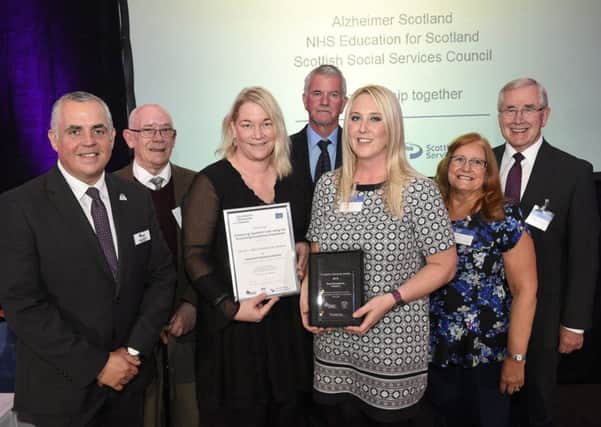Nurses help to improve NHS Fife's dementia care


Their hard work saw NHS Fife pick up the Best Educational Initiative at Scotland’s Dementia Awards in Glasgow last week.
Coinciding with World Alzheimer’s Day, the awards celebrate the achievements of those making a difference to the lives of people living with dementia and their families.
Advertisement
Hide AdAdvertisement
Hide AdEnhancing Inpatient Care using the Promoting Excellence Framework was developed by Gillian Grubb and Kerry Lowe.
The two senior charge nurses at Stratheden Hospital struck on the idea when new health care assistants joined their wards.
Gillian said: “They had never worked in a hospital setting before or with people who had dementia.
“We wanted to ensure they had the knowledge and skills required to work with our dementia patients and their families.
Advertisement
Hide AdAdvertisement
Hide Ad“So together we developed a two-day, bespoke training programme to enhance the knowledge and skills of staff who work with people living with dementia, their carers and relatives.”
Gillian and Kerry spent several months working on the programme, creating power point presentations and videos to deliver alongside the training.
And over the last two years 129 members of staff at NHS Fife have benefited.
While they are pleased that their programme has been singled out for praise, the duo are prouder still of the results it has achieved.
Advertisement
Hide AdAdvertisement
Hide AdGillian explained: “We were delighted to be shortlisted as finalists – that was an honour in itself.
“So to win the award was fantastic.
“But the biggest reward for us is seeing how the staff have embraced the training and the projects they’ve set up as a result of it.
“In the current climate, it’s difficult to release staff to attend a two-day training course.
“And very often when they do attend courses they don’t get a chance to do much with what they have learned.
Advertisement
Hide AdAdvertisement
Hide Ad“So on day one of our course we ask them to consider a service improvement they can introduce on their wards once the training is finished.
“We encourage them to think as small or as big as they like – as long as it makes a difference to people living with dementia, their carers, families or staff.
“Some of the work which has been done at Stratheden and Queen Margaret Hospitals is truly amazing.
“A student teaching plan has been developed and a family room created to enhance visiting.
Advertisement
Hide AdAdvertisement
Hide Ad“A multi-sensory room has been developed in the Elmview ward at Stratheden with help from the hospital’s League of Friends.
“Personal signage has been installed on several bedroom doors and sensory boxes introduced on some of the wards.
“That has been the biggest reward – seeing staff taking ownership of the training and working on these projects to enhance life for patients, carers and relatives.”
But Gillian and Kerry are not content to rest on their laurels and are continually developing the programme.
Advertisement
Hide AdAdvertisement
Hide AdGillian added: “We’re using feedback from staff to enhance the training and will continue to adadpt it to meet our service needs.
“We initially ran the training for staff in our older adult inpatient wards.
“We’ve since opened it up to community teams working with older adults.
“We’re now hoping to offer it to our colleagues in social services.
Advertisement
Hide AdAdvertisement
Hide Ad“And there’s no reason why it could not be used in other areas of Scotland.”
Given its award-winning credentials, other NHS boards may well soon be knocking on the door.
Speaking after the awards ceremony, Henry Simmons, Alzheimer Scotland’s chief executive, said: “We were thrilled to celebrate the work of so many innovative and dedicated individuals alongside the hugely impressive collaborations that are taking place.
“Their combined efforts are helping to dramatically improve services, address stigma, break down barriers and ensure that nobody faces dementia alone.
Advertisement
Hide AdAdvertisement
Hide Ad“This year’s winners have set a new precedent and we were delighted to see everyone congratulated for their efforts to support people living with dementia and their families.”
There are 90,000 people living with dementia in Scotland – just under 7000 of them in Fife. And it is estimated that 20,000 people every year will be diagnosed with the condition by 2020.
Staff training, step by step
The two-day course boasts six modules, based on the Promoting Excellence Framework and in line with the NHS Education for Scotland dementia skills training resource pack.
The first module focuses on understanding dementia, looking at different types of dementia and the effect it has on a patient’s brain.
Advertisement
Hide AdAdvertisement
Hide AdIt covers the impact diagnosis has and explores how every person’s dementia journey is unique to them.
Module two promotes person and family-centred care – ensuring staff fit the care around the person rather than the person round the care.
Module three promotes the importance of health and well-being for people with dementia. It explores the impact hospital admissions can have on a patient’s life as well as the importance of keeping people with dementia physically well, covering such issues as nutrition, hydration, personal care, sleep patterns, pain, delirium and palliative and end of life care.
Module four explains to staff how best to meet the needs of a person with dementia who is stressed or distressed. It looks at the triggers and causes and how to communicate with patients who do experience stress or distress.
Advertisement
Hide AdAdvertisement
Hide AdModule five explores how to support and protect people’s rights, using the Charter of Rights to ensure each patient is involved in their own care or their carer is, if they have capacity issues. This module also promotes equality and supports diversity.
And module six explores how cognitive stimulation therapy can be used to interact with people living with dementia. Everything from crossword puzzles to physical games and music can help stimulate the brain and help staff engage with dementia patients.